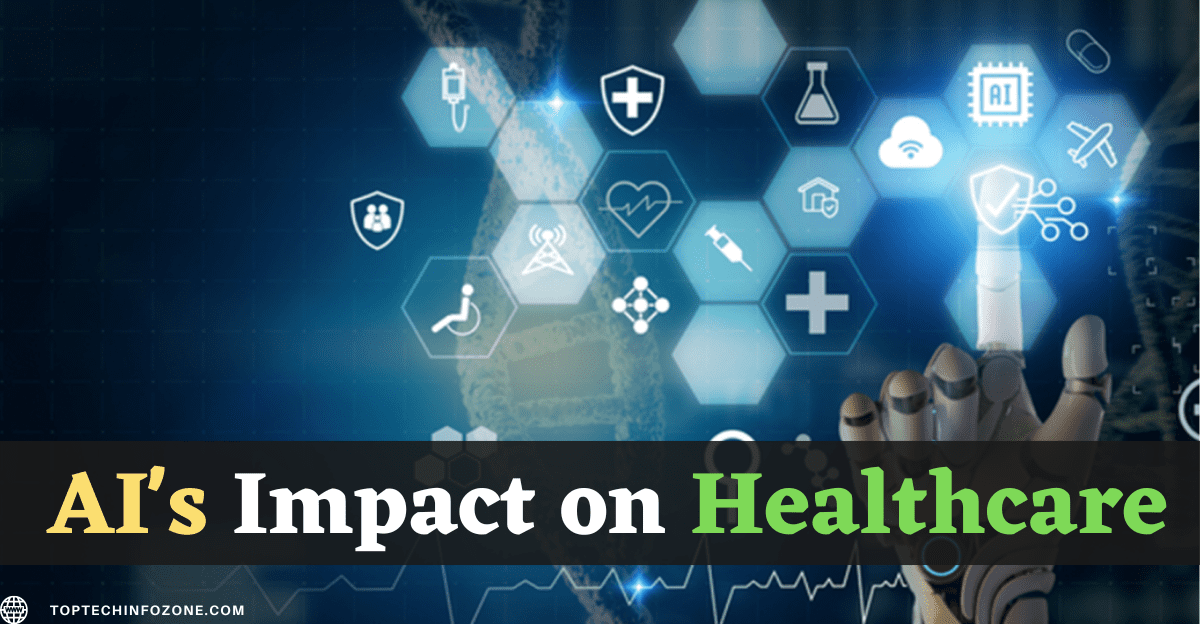Discover the remarkable impact of AI on healthcare – from improved diagnostics to personalized treatment. Explore the benefits and challenges of AI adoption and its potential to revolutionize global healthcare.
In recent years, artificial intelligence (AI) has emerged as a transformative force in various industries, and healthcare is no exception. From revolutionizing diagnostics to enhancing patient care, AI’s applications in healthcare have been remarkable. In this article, we will delve into the significant ways AI is reshaping the medical landscape and discuss the challenges and benefits associated with this technological advancement.
Introduction
The integration of AI in healthcare has brought about revolutionary changes, opening new possibilities and improving patient outcomes.
Its ability to analyse vast amounts of data quickly and efficiently has made AI a game-changer for medical professionals worldwide. Let’s explore some of the key areas where AI is making a significant impact.
AI’s Impact on Healthcare
AI’s impact on healthcare has been nothing short of revolutionary. Its ability to process and analyse large datasets has led to more accurate and personalized treatment options for patients.
Furthermore, AI-powered algorithms can now identify patterns and trends that humans might miss, leading to early disease detection and prevention.
Natural Language Processing (NLP) plays a pivotal role in enhancing human-machine interaction by enabling machines to comprehend and respond to human commands and queries.
The Rise of AI in Healthcare
AI’s rise in healthcare has transformed the industry by streamlining processes and optimizing workflows.
The adoption of AI-driven solutions has led to faster and more accurate diagnoses, improving patient outcomes and reducing the burden on medical professionals.
Improved Diagnostics and Personalized Treatment
One of the most significant advantages of AI in healthcare is its role in diagnostics.
AI algorithms can analyse medical data, such as lab results, genetic information, and medical histories, to identify potential health risks and predict disease progression.
By harnessing this power, healthcare providers can tailor treatment plans to individual patients, ensuring the most effective and personalized care.
Challenges and Concerns with AI’s Impact on Healthcare
While AI brings a wealth of opportunities, it also raises ethical concerns.
As AI becomes more involved in healthcare decision-making, questions regarding patient privacy and consent arise.
The responsible and transparent use of AI is crucial to maintain patient trust and confidentiality.
Ethical Considerations
Ensuring the ethical use of AI in healthcare requires a careful balance between technological advancements and ethical standards.
Medical professionals and policymakers must work together to establish guidelines that prioritize patient well-being and adhere to moral principles.
Data Security and Privacy
The digitization of medical records and the use of AI raise concerns about data security and privacy.
Protecting sensitive patient information from data breaches and cyberattacks is of utmost importance to maintain trust in AI-driven healthcare solutions.
AI Applications in Diagnosing Diseases
Early detection and accurate diagnosis are crucial for successful medical interventions. A
I has proven to be a powerful tool in diagnosing diseases, particularly in fields like radiology and pathology.
Early Detection and Prevention
AI algorithms can analyse medical images and identify subtle abnormalities that may indicate the early stages of a disease.
This early detection enables timely interventions, significantly improving patient outcomes and reducing the cost of treatment.
AI in Radiology and Imaging
AI’s integration in radiology has revolutionized medical imaging interpretation.
AI-powered tools can rapidly analyse X-rays, MRIs, and CT scans, assisting radiologists in detecting abnormalities with higher precision and speed.
AI and Pathology
In pathology, AI-driven image analysis has been invaluable in diagnosing diseases from tissue samples.
AI algorithms can identify cellular patterns, aiding pathologists in accurate diagnoses and treatment recommendations.
AI-Assisted Surgery
AI’s influence extends to the operating room, where it supports surgeons and enhances precision during complex procedures.
Precision and Safety
AI-assisted surgery enables unprecedented precision during surgical procedures, minimizing the risk of errors and complications.
Surgeons can rely on AI to enhance their skills and achieve optimal patient outcomes.
Robotics in the Operating Room
AI-powered robotic systems have taken surgical capabilities to a new level.
These robotic assistants can perform delicate surgeries with incredible accuracy, even in challenging anatomical locations.
AI in Drug Development
The drug development process can be lengthy and costly. AI has stepped in to accelerate research and discovery, expediting the identification of potential drug candidates.
Accelerating Research and Discovery
AI’s computational power allows for the rapid analysis of vast chemical databases, identifying potential compounds with therapeutic benefits.
This accelerates the initial stages of drug development and reduces the time to market for new medications.
Identifying Drug Candidates
AI’s ability to predict drug interactions and side effects aids researchers in selecting the most promising drug candidates for further development.
This targeted approach optimizes resources and increases the likelihood of successful drug trials.
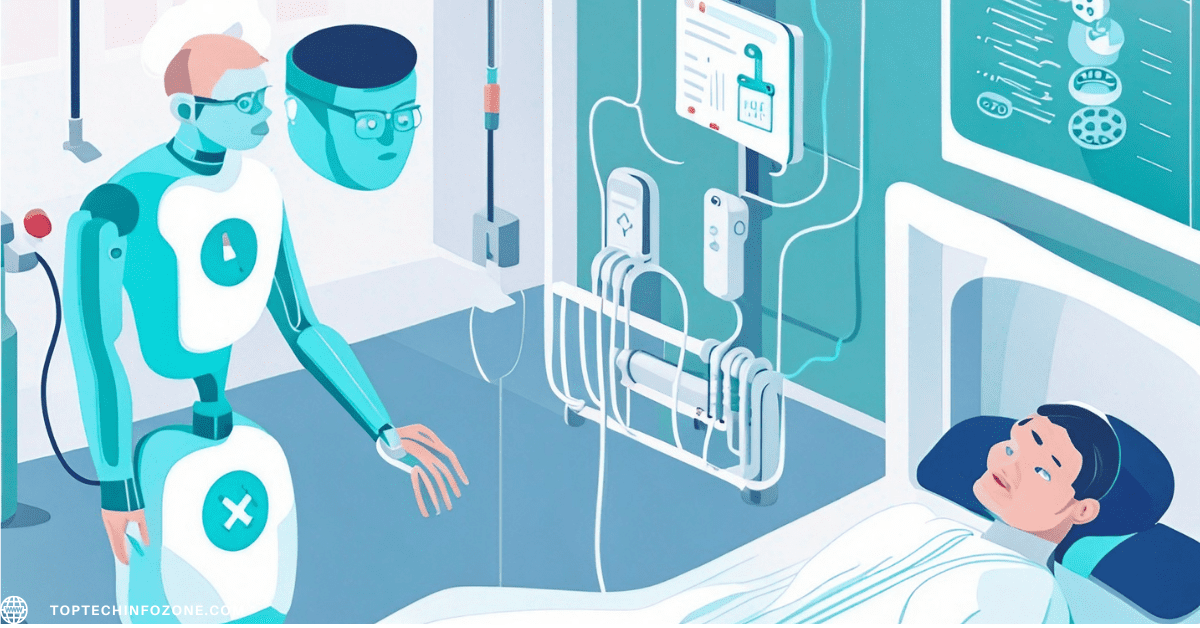
AI in Patient Care
Beyond diagnostics and treatment, AI has transformed patient care, making it more accessible and convenient.
Virtual Health Assistants
AI-driven virtual health assistants provide patients with real-time medical guidance and support.
These digital companions can answer medical questions, provide medication reminders, and offer lifestyle recommendations, empowering patients to take charge of their health.
Remote Monitoring and Telemedicine
AI-enabled remote monitoring devices allow healthcare providers to monitor patients’ vital signs and health metrics remotely.
Telemedicine consultations facilitated by AI have become essential, especially in remote or underserved areas.
Enhancing Patient Experience
AI’s ability to personalize patient care extends to enhancing the overall healthcare experience.
By analysing patient preferences and medical histories, AI can optimize hospital stays and create a more comfortable environment for patients.
AI and Mental Health
Mental health has also witnessed AI’s transformative impact, with AI-powered tools enhancing diagnosis and treatment options.
AI in Mental Health Diagnosis
AI algorithms can analyse speech patterns, facial expressions, and other behavioural cues to identify signs of mental health disorders.
These early interventions can improve mental health outcomes and prevent severe conditions.
AI-Driven Therapies
AI-driven virtual therapy platforms provide accessible mental health support to individuals facing various challenges.
These platforms offer tailored therapeutic approaches, catering to each patient’s unique needs.
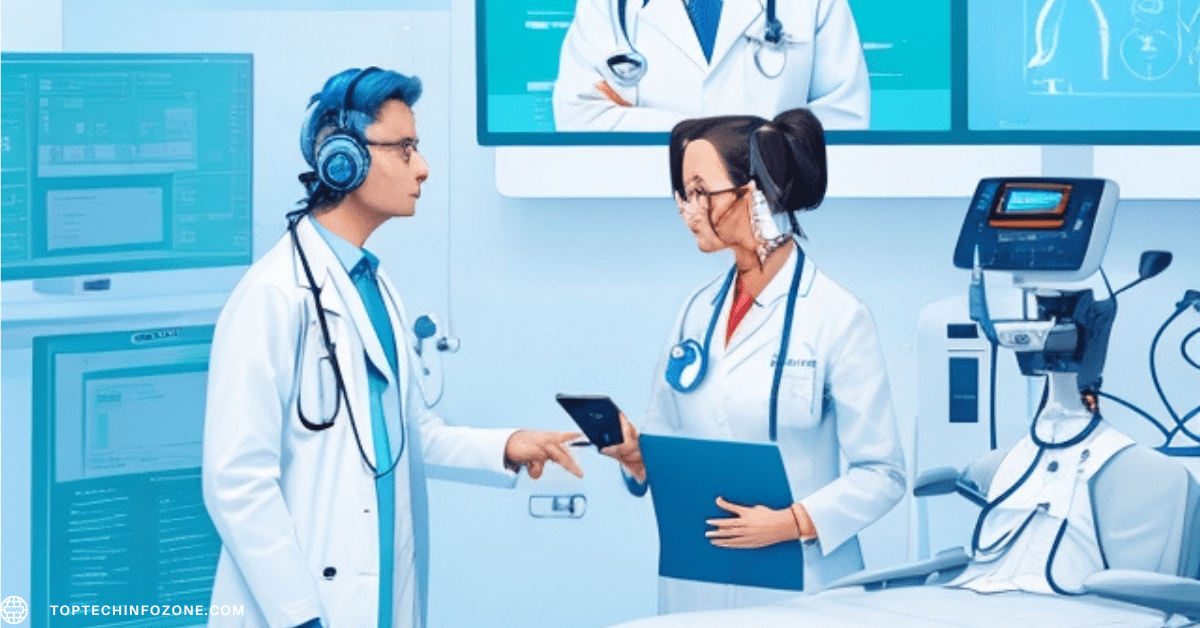
AI and Health Records
AI has facilitated the digitalization and analysis of medical records, leading to more efficient healthcare management.
Digitalization of Medical Records
The transition from paper-based medical records to digital formats has streamlined healthcare processes.
Digital records enable secure and seamless information sharing among healthcare providers, enhancing collaboration and patient care.
Data Management and Analysis
AI’s ability to process vast amounts of data quickly allows healthcare institutions to identify trends and patterns that can inform decision-making.
This data-driven approach helps medical professionals make more informed choices in patient care.
The Future of AI in Healthcare
The integration of AI in healthcare is still in its nascent stages, but the potential for further advancements is vast.
Continuous Advancements
As AI technology evolves, so will its applications in healthcare. Continuous research and development will lead to improved algorithms and more refined healthcare solutions.
AI and Global Healthcare
AI has the potential to bridge the healthcare gap in developing nations and improve accessibility to medical services.
AI in Developing Nations
In resource-limited regions, AI-driven telemedicine and remote diagnostics can bring healthcare services to underserved communities, improving health outcomes and reducing disparities.
Potential Impact on Accessibility
AI’s ability to optimize healthcare delivery can improve access to medical services for individuals in remote areas or with limited mobility.
This technology has the potential to democratize healthcare, making it more inclusive and accessible to all.
The Human Touch in the Age of AI
While AI brings undeniable benefits, maintaining the human touch in healthcare remains crucial.
Balancing Technology and Compassion
The integration of AI should complement, not replace, the human element in healthcare. Compassion, empathy, and human interaction are irreplaceable aspects of the healing process.
Conclusion of AI’s Impact on Healthcare
The impact of AI on healthcare is profound and far-reaching. From diagnostics to treatment and patient care, AI has revolutionized the medical landscape, offering improved outcomes and enhanced patient experiences. However, it is essential to approach AI adoption responsibly, addressing ethical concerns and safeguarding patient privacy. By striking a balance between AI and the human touch, we can create a future where technology and compassion work hand in hand to improve global healthcare.
Frequently Asked Questions (FAQs)
AI’s impact on healthcare includes improved diagnostics, personalized treatment plans, and enhanced patient care through the use of advanced algorithms and data analysis.
AI can analyse medical data and identify subtle abnormalities, allowing for early detection and timely interventions.
Yes, AI is widely used in radiology to assist in interpreting X-rays, MRIs, and CT scans, improving accuracy and speed.
AI accelerates research and discovery by analysing vast chemical databases, identifying potential drug candidates, and predicting interactions.
AI improves patient care through virtual health assistants, remote monitoring, and personalized healthcare experiences.
AI aids in mental health diagnosis and offers virtual therapy platforms, enhancing access to mental health support.
Related Posts:
- Unlocking Ethical Implications of AI: Unveiling Unforeseen Consequences (2023)
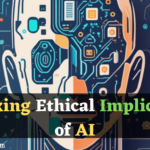
- AI in Finance: Predictive Analytics and Fraud Detection (2023)
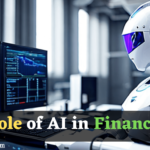
- Chatbots and Virtual Assistants: Enhancing Customer Experience (2023)

- AI and Robotics: Transforming Industries (2023)
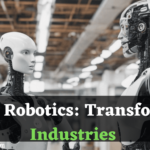
- The Role of AI in Cybersecurity and Threat Detection (2023)

